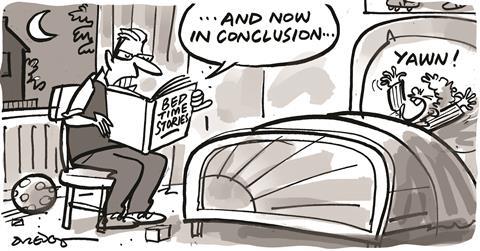Jeff Lucas on having to apologise for a thoughtless comment made while in the pulpit

The thought was buzzing around my brain like a pesky mosquito. I’d tried to swat it away in vain. And now I was sweating, not least because this crisis was happening in the middle of the sermon, there were thousands in the congregation and I was the preacher. Nearing the end of the talk, I uttered those words that are music to the ears of most congregants: “And now, in conclusion…” Those of us who preach and teach often say: “Finally…” or “As I finish…” We do that to give people hope.
My brain was divided because I knew that I needed to end my talk in a rather unusual way. A few minutes earlier, I had made an impromptu remark, and the moment I uttered it, I regretted it. My comment had been harsh and laced with sarcasm, and now I knew what was ahead. I had to land the talk, pray and then double back to that thoughtless comment, withdraw it and ask everyone for forgiveness. I followed what I sensed was a nudge from the Holy Spirit, expressed my regret and apologised.
The experience reminded me that those of us who stand on platforms or behind pulpits have raw power, and we need to handle it with care. Nice, well-meaning Christian people have a tendency to believe what they hear from church leaders, and sometimes we can inadvertently or carelessly use words that bruise and confuse.

As a young Christian, I remember the panic that I felt when I heard one rather menacing preacher yell: “If Jesus is not Lord of all, he’s not Lord at all!” Yikes! While the call to make Christ both Lord and saviour is undeniable, how on earth can you or I to come to a place where we can be sure of his absolute, total kingship over every single area of our lives? With every passing second our hearts, thoughts and motives change. And then, if I ever did arrive at what I now think of as a tormenting and unreachable mirage of total submission, am I self-deluded and arrogant as I affirm that?
Another preaching favourite is: “You can’t out-give God!” Oh, really? If that is actually true, why don’t more of us just dash out and empty our bank accounts forthwith?
An offhand comment totally paralysed me as a newer believer. The slogan in question actually adorns a lot of Christian refrigerators as a decorative magnet: “If you want to hear God laugh, tell him your plans.” What a thoroughly nasty (and perhaps even wicked) notion; one that paints a loving, caring Father as a sneering, dismissive despot. As a human father, I’m thrilled when my kids tell me their dreams. Jesus made it clear: our heavenly Father is like no other father we’ve ever known. However good, kind and caring we are, God the Father is so much more.
So, pray for those of us who, weekly, stand before God’s people with a sword in hand – the “sword of the Spirit”; the “word of God” (Ephesians 6:17). Those who wield swords wildly tend to cut and maim others. Preachers carry heavy responsibility, not least because, one day, we will give account for what we say and how we say it.
As we hurtle towards Christmas, many who don’t usually darken the doors of a church will park themselves in pews. Perhaps your congregation has organised some special Advent events; a carol service here, a children’s nativity there. If so, ask the Lord to bless those who will preach, that visitors might hear the marvellous good news of the gospel and respond to it.
Let’s prayerfully tell God about everything that’s planned and, as we do, let’s know this: he won’t laugh.






































No comments yet